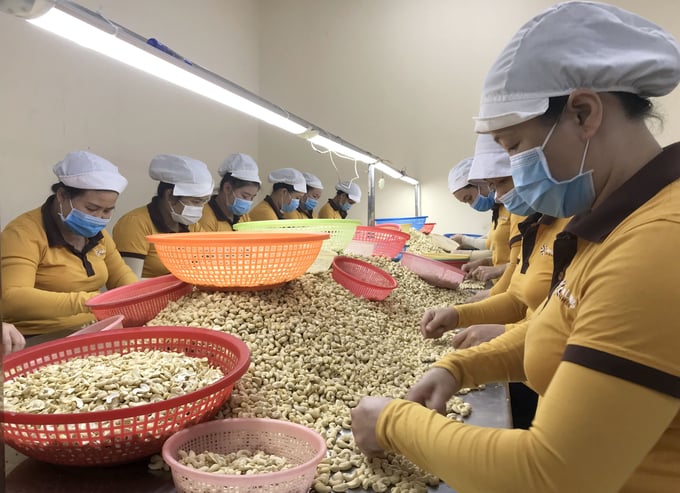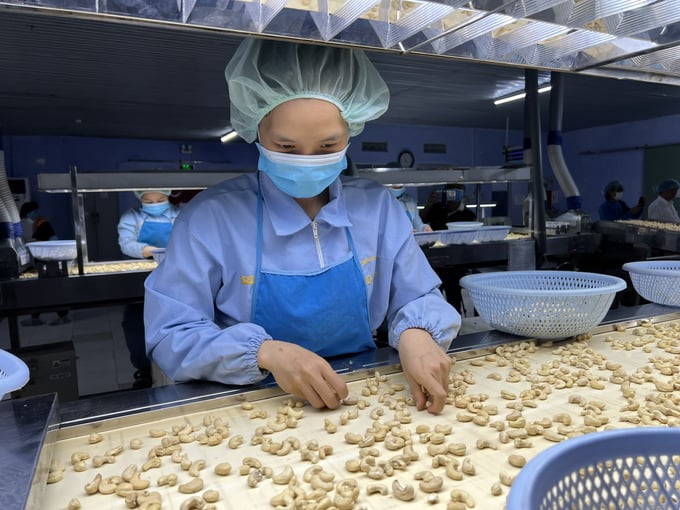November 22, 2025 | 00:23 GMT +7
November 22, 2025 | 00:23 GMT +7
Hotline: 0913.378.918
November 22, 2025 | 00:23 GMT +7
Hotline: 0913.378.918
Vietnam has been the world leader in cashew exports since 2006, with a consistent increase in export volume. The export of 644,000 tons of cashew kernels, valued at USD 3.6 billion, by Vietnam in 2023 set a new record. Nevertheless, Vietnam's cashew industry has been reliant on importing raw cashews for a long time to achieve billion-dollar status and dominate the global cashew kernel market, as there is insufficient domestic production for export processing. The primary source of unprocessed cashew imports is Africa, with a volume of millions of tons annually. Vietnam imported nearly 2.9 million tons of fresh cashews in 2023, with more than 2.2 million tons originating from Africa.
Since 2017, the importation of raw cashews has been instrumental in the production of over USD 3 billion in annual export revenue. However, the Law on Food Safety, as outlined in Decree 15/2018/ND-CP (Decree 15), has presented substantial obstacles for businesses that import unprocessed cashews from Africa.

Raw cashews imported from Africa. Photo: Son Trang.
Mr. Ta Quang Huyen, Chairman of Hoang Son 1 Company in Binh Phuoc, observed that cashew exports are not always advantageous during a consultative forum entitled "Identifying Challenges and Seeking Trade Facilitation Solutions for the Cashew Industry." In the past, companies could redirect their attention to domestic sales of cashew kernels processed from African raw cashews by re-declaring with customs and paying taxes in the event of export difficulties.
However, businesses that import unprocessed cashews from Africa have been subject to a single pathway since Decree 15 was implemented: export processing. Companies are incapable of transitioning to domestic sales, even when export markets stagnate and they are unable to sell to foreign customers.
Mr. Bach Khanh Nhut, Vice President of the Vietnam Cashew Association (VINACAS), attributes the challenge to the regulations in Point A, Clause 1, Article 14 of Decree 15, which mandate that plant-based food products imported for food use must originate from countries or territories with food safety control systems that meet Vietnamese standards. To export plant-based food to Vietnam, they must register with Vietnamese authorities and be included on the list of countries and territories that are authorized to do so.
Mr. Nhut is of the opinion that this regulation is essential to establish a technical barrier for food safety in the context of imported food products. Nevertheless, this requirement presents a significant challenge for the cashew industry, as the "List of Countries and Territories Registered to Export Plant-Based Food to Vietnam" does not include African countries that export unprocessed cashews to Vietnam.

Cashew kernel production at a factory in Dong Nai. Photo: Son Trang.
Thus, despite the fact that African raw cashews imported for processing must endure quarantine, they are unable to be diverted to the domestic market for any reason and must be exported. Failure to comply with this regulation may lead to contraband charges. This regulation has resulted in prosecutions against numerous businesses and business proprietors in recent years.
According to the Binh Phuoc Customs Department, the "List of Countries Registered to Export Plant-Based Food to Vietnam" published on the website of the Plant Protection Department (Ministry of Agriculture and Rural Development) does not include African countries that produce and export raw cashews. This has resulted in the restriction of unprocessed cashew imports from African countries to export-oriented processing.
The Binh Phuoc Customs Department has issued an official letter in an effort to alleviate the export-import issues for cashew products, as it recognizes the obstacles encountered by cashew enterprises in relation to the importation of raw cashews from Africa. This letter, which is addressed to the General Department of Customs, the People's Committee of Binh Phuoc, and the Central Inspection Committee's Anti-Corruption Task Force, suggests that cashews from African countries be permitted for consumption in Vietnam. The department also recommends the investigation and implementation of appropriate trade defense measures to safeguard domestic cashew cultivation.

In 2023, Vietnam's cashew kernel exports reached a record high of 644,000 tons, valued at USD 3.6 billion.
Lawyer Le Trong Them observed that the revision of Decree 15 would be time-consuming due to the necessity of gathering input from numerous stakeholders. Consequently, he suggested a system for overseeing product migration that would enable businesses to transfer imported African cashew cargoes to other companies.
Translated by Linh Linh
/2025/11/21/3348-2-102623_454.jpg)
(VAN) National Assembly delegate Nguyen Thi Lan has proposed adding special mechanisms to attract human resources to the agricultural, forestry, and fishery sectors, addressing the shortage of high-quality personnel.

(VAN) Over the past two decades, the unified legal framework for water resource management has been perfected, becoming a crucial foundation for ensuring national water security.

(VAN) The land-data cleansing campaign in Dien Bien is entering its final stretch, yet weak infrastructure, limited personnel and fragmented multi-period datasets continue to create major obstacles.
/2025/11/20/0204-2-115235_496.jpg)
(VAN) Not only do carbon credits bring a great revenue source, but they also contribute to better forest protection and development. However, this potential remains largely untapped.

(VAN) Applying modern technology is helping environmental monitoring and oversight of management quality.

(VAN) Viet Nam’s economic losses could reach 12–14.5% of GDP annually by 2050 if no climate-response measures are implemented.

(VAN) Initial calculations suggest that blue carbon initiatives could reduce CO2 emissions by approximately 3 million tons in Viet Nam by 2035.